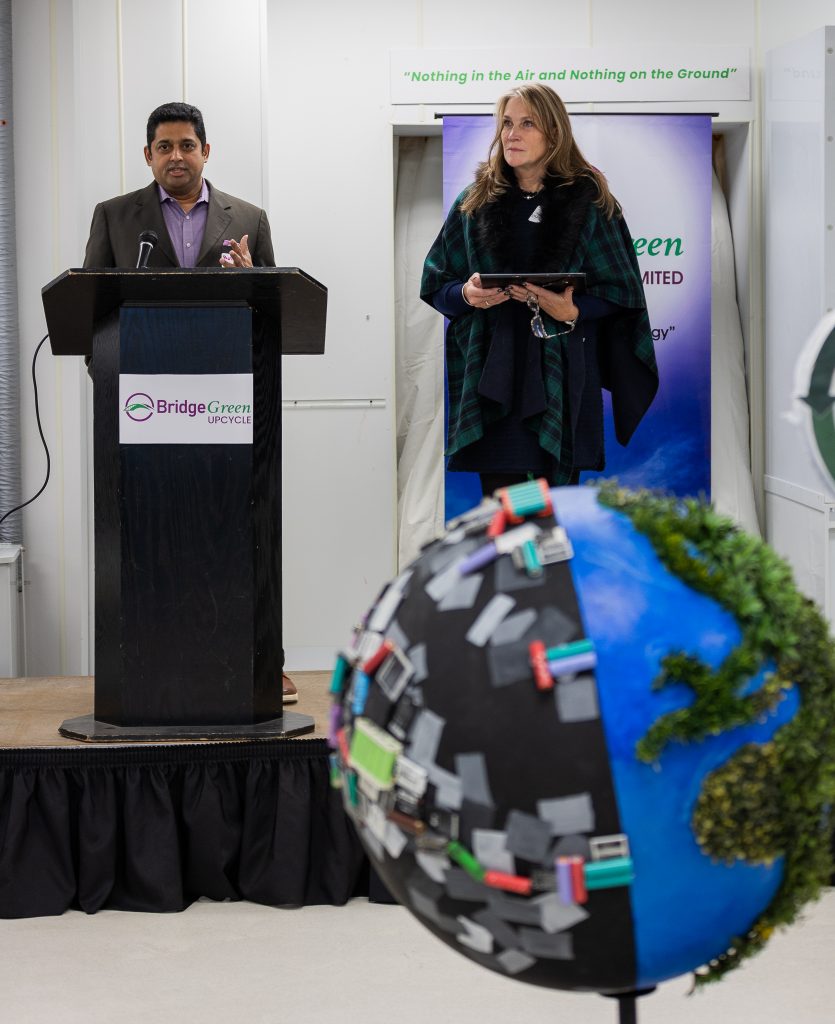Bridge Green Upcycle, a startup founded by Binghamton University alumnus Balki Iyer MS ‘00, hosted a launch event for its new Infinity Lab & Prototype Facility last week. Held at Huron Campus in nearby Endicott, visitors heard from company leaders and community partners and embarked on an in-depth guided tour through the facility.
“This marks an exciting milestone for our team as we inaugurate a facility that emphasizes technological innovation in support of the circular economy,” wrote Annamarie Chironis ‘24, Bridge Green Upcycle’s commercial and strategy analyst. “Beyond advancing domestic supply chain resilience, our mission includes creating green-collar jobs for the Broome County community.”
Before the event began, professionals from various community organizations enjoyed hors d’oeuvres during a networking session.
Iyer, the company’s founder, opened the event with a 10-minute speech. He welcomed visitors with gratitude before sharing a brief story about Mahatma Gandhi, describing a moment when Gandhi told his professor he would take a bag of money rather than a bag of wisdom because “everyone takes what they don’t have.” He drew a parallel between this story and how life as an entrepreneur is not about wishing for things, but about creating and building a business around the things you want.
“Today we use batteries like the way we use oil, but that’s not how it’s going to be 20 years from today,” Iyer said. “Effectively, this might be a small gathering of important people, but we’re not just starting a business, we are starting a movement. I truly, firmly believe that we are starting a movement of how we are going to extract critical minerals in this country so that we don’t treat batteries like the way we treat oil.”
He described Bridge Green’s focus on technological advancements and improvements to make changes in cost-effective and environmentally friendly ways. On the company’s website, Bridge Green touts cutting-edge digital and material technologies to revolutionize clean energy by upcycling lithium-ion batteries. The technology they have developed is driven by a commitment to lessen the battery disposal process’ environmental impact to conserve essential mineral resources and to reduce dependency on mining activities for raw materials, the website says.
“I want to just say that none of this is possible without the amazing support of a lot of people that are here,” Iyer said. “I really, truly believe that this is a once in a lifetime opportunity to make a big change that can help not only this region and this country, but also the planet.”
Jennifer Lupo ‘94, the vice president of energy solutions, supply chain and leasing at The Raymond Corporation, was then invited to speak as a Bridge Green partner. She started by sharing Binghamton’s 2023 designation by the federal government as a hub for battery innovation.
A coalition led by the University, the New Energy New York project received this Regional Tech Hub designation from the Biden-Harris administration and the U.S. Department of Commerce’s Economic Development Administration. This was established to spur job creation and innovation in the region by strengthening this area’s capacity for creating, selling and utilizing competitive technology.
Lupo said BU continues to earn recognition and funding for battery research and development through the Build Back Better Regional Challenge award, received in September 2022, and the National Science Foundation Engines award.
“Lithium-ion batteries are the once-in-a-generation technology opportunity we have to embrace,” Lupo said. “I have long said, ‘Why not this opportunity for New York? Why not this opportunity for Binghamton?’ The Southern Tier has been perfectly positioned both at the regional and federal levels to seize this opportunity to our benefit.”
After Lupo described Bridge Green’s unique process for sustainably maximizing the reclamation of minerals and thanked the company for choosing the Southern Tier, another speaker, Bahgat Sammakia, a SUNY distinguished professor of mechanical engineering and the vice president for research at Binghamton University, was welcomed to the stage.
“I know for a fact that lithium is going to be the way to go for many years to come,” Sammakia said. “In the future, it may change, but for many years to come we have a generation of lithium batteries that we have to deal with, and recycling becomes a critical element. It’s not just about manufacturing batteries and then throwing them in a wasteland. It’s about how to make even lithium-ion batteries sustainable.”
Sammakia offered his support, restated his dedication and commitment to batteries and referenced the ongoing Build Back Better challenge and the NSF Engine award as additional sources of support for Bridge Green’s pioneering efforts.
Patrick Doyle from the Greater Binghamton Chamber of Commerce was then introduced as the fourth speaker. He offered support and congratulations to Iyer and Bridge Green on behalf of the agency and reiterated their partnerships with BU and the Raymond Corporation.
Iyer offered a closing statement and expressed gratitude to the community partners and local businesses involved in the grand opening. Mark Poliks, a SUNY distinguished professor and the director of the Center for Advanced Microelectronics Manufacturing was invited up alongside Rachael Cornick, Bridge Green’s vice president of operations and an adjunct professor at BU, for a ribbon-cutting to mark the momentous occasion.
Visitors were then split into groups of four and guided through an Infinity Lab tour. Various members of the company’s leadership team and community partners then provided detailed accounts of the processes involved at each workstation, including how they monitor battery health, innovate second-life battery usage and extract high-grade black mass and other high-purity precursor materials.
“What I want to say is that it’s not enough to be successful alone,” Iyer said. “It’s important to be making sure that you’re bringing a lot of people along.”



